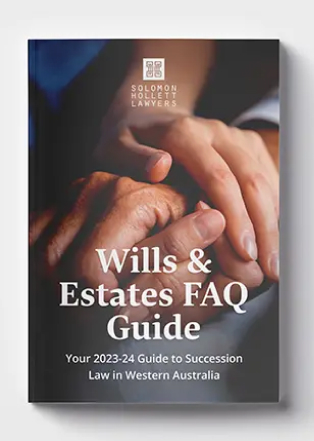What is Probate?
When someone passes away and they leave a valid Will, their Will appoints an executor (or sometimes, a number of executors acting jointly). The executor is the person who takes control of the deceased’s assets, pays their debts and distributes the estate according to the terms of the Will and according to law.
In order to carry out these tasks, the executor must make an application to the Supreme Court of Western Australia for a grant of Probate. The grant of Probate is an official Court document that attaches the Will and gives the executor the formal authority to deal with the Deceased’s estate. Without the grant of Probate, the executor cannot deal with bank accounts, superannuation interests or real estate.
What are Letters of Administration?
Where there is no Will or if the named executor in the Will has died or does not want to be the executor, then instead of getting a grant of probate, the Court will issue Letters of Administration instead.
In this case (and so long as there is no dispute as to who should be appointed as the administrator of the estate), the proposed administrator would make an application pursuant to the Rules and the Administration Act (WA) 1903 asking the Court to issue a grant of Letters of Administration in the name of the proposed administrator.
Once a grant of probate or a grant of Letters of Administration is made, the executor or administrator then starts administering the estate, and this process is known as administration.
How does an executor or administrator get a grant of Probate or Letters of Administration?
When there is no dispute as to who the executor of a Will is or who the administrator might be, the executor or administrator makes an application to the Supreme Court, asking the Court to issue a grant in their name. This is in what is called the non-contentious probate jurisdiction of the Supreme Court and are governed primarily by the Non-Contentious Probate Rules (WA) 1967 (‘the Rules’)
The Rules set out what information needs to be provided to the Court in making these applications in the non-contentious Probate jurisdiction, including but not limited to: –
- Date of birth of the deceased;
- Details of death, including date and place and a copy of the death certificate;
- Relationship details of the Deceased (i.e. single, married, widowed etc); and
- Details of the assets left by the Deceased in Western Australia
- The original Will of the Deceased (unless they died without a Will).
Applications in the non-contentious Probate jurisdiction are determined by a Registrar of the Court ‘on the papers’, meaning the Registrar considers the material filed with the Court and decides to issue a Grant or request further information. There are generally no Court appearances required.
Whilst on the surface it may look like getting a grant of probate of a Will and getting a grant of Letters of Administration are similar, where there is no Will, there are a number of other factors which makes the process of getting Letters of Administration more complex and more expensive.
If the Court makes a grant here, it is known as a Common Form grant.
But what happens when there is a dispute over who is the correct executor, or who should be the administrator?
The Contentious Probate Jurisdiction
When there are two or more different parties contending that they should be the executor or administrator of the estate, or allegations that a Will is invalid, it cannot be said that at that point the matter is ‘non-contentious’ – but there is clearly a contention between the parties wanting to be appointed.
This means that for the Court has to decide who should be appointed, and contentious court proceedings must be commenced. The most common form of contentious court proceedings in estate matters is ‘solemn form’ proceedings, which generally come about when one party asserts that a Will isn’t valid for some reason.
The difference between contentious proceedings and an application in the non-contentious jurisdiction include, but are not limited to the following: –
| Contentious | Non-Contentious | |
| 1. | Commenced by a plaintiff (i.e. one of the parties contending that they should be appointed) and names defendants (i.e. the other party contending they should be appointed, and any other person who might be entitled to be appointed) | Commenced by an applicant and does not name any other parties |
| 2. | The originating documents (generally a Writ of Summon and Statement of Claim) must be served on the defendants | Generally, no obligation to give notice of application being made if there is a valid Will, but consents of other persons entitled to administration is required when there is no Will |
| 3. | Both parties provide pleadings and evidence to support their position. Evidence may be on affidavit or oral | Only the applicant provides evidence on affidavit |
| 4. | Proceeds as usual commercial litigation to a trial | Does not involve any hearings or trials |
| 5. | Decided by a single Judge of the Supreme Court | Decided by a single Registrar of the Supreme Court |
| 6. | Results in a ‘solemn form’ grant | Results in a ‘common form’ grant |
| 7. | Can be expensive and time consuming | Comparatively inexpensive |
Solemn Form Grant vs Common Form Grant
In order for the Court to make a grant in solemn form, the Court must be satisfied of the formal validity of the Will, to the civil standard. This means that the Court must be satisfied, on the balance of probabilities and based on all of the evidence put forward, that it is more probable than not that the Will is valid.
What evidence the Court takes into consideration in deciding this will depend on the facts of the case and the nature of the dispute between the relevant parties.
The primary difference between a grant in solemn for and a common form grant is that a common form grant is revokable, and a grant is solemn from is not (with limited exceptions)[1]. It makes sense then, that the burden of proof is higher for a grant in solemn for to be made.
Should I make a non-contentious or contentious application?
If there are no disputes as to who the executor or administrator of the estate is, an application for a common form grant should be made in the non-contentious Probate jurisdiction of the Supreme Court.
If any of the following circumstances exist, it may be more appropriate for an application to be made in the contentious jurisdiction of the Supreme Court (and note that this is not an exhaustive list): –
- There are multiple Wills, and disagreement about which Will is the last valid Will of the Deceased;
- There are concerns or allegations that the Deceased lacked the requisite testamentary capacity when the Will was made, or was forced to make the Will due to undue influence or pressure;
- The original Will cannot be located, and it is thought that the Deceased revoked the Will by destroying it;
- An appointed executor is not up to doing the job, but refuses to renounce their position; or
- There are multiple persons entitled to be appointed as the Administrator and cannot agree who should be appointed.
It is not uncommon for an application for a common form grant to be filed with the Court, which is then superseded by an application in the contentious jurisdiction (usually from another party). Due to the very nature of the contentious probate jurisdiction and the orders that flow from those proceedings, the contentious proceedings will take precedence over the non-contentious application.
If you have concerns about who is control of an estate, or in relation to a Will that you anticipate will be propounded, you should take legal advice sooner rather than later – it is always a more complicated job to unravel the making a grant that perhaps should not have been made in the first place.
[1] Wheatley v Edgar [2003] WASC 118 [18].









